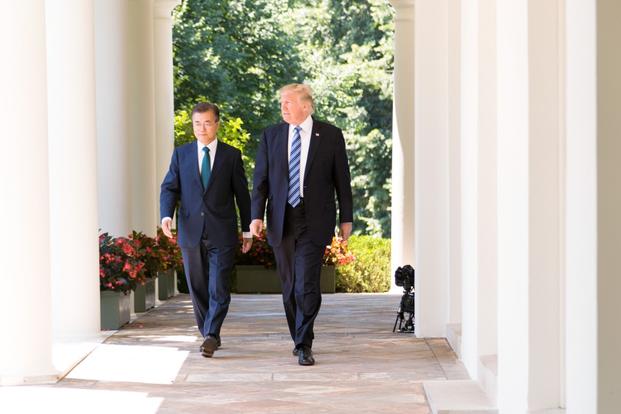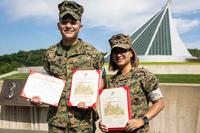President Donald Trump said Friday that U.S. "patience" with the buildup of North Korea's nuclear and missile programs that could threaten the U.S. had come to an end.
Speaking alongside South Korean President Moon Jae-in in the White House Rose Garden, Trump said, "The era of strategic patience with the North Korean regime has failed and, frankly, that patience is over."
He was referring to the Obama administration's policy of "strategic patience" that relied on diplomatic and economic pressure, coupled with the influence of China and other neighbors, to rein in the nuclear ambitions of North Korean dictator Kim Jong-un.
Moon, who was elected in early May and held his first meetings with Trump on Thursday, sought to portray his stance as in line with that of Trump while leaving room for outreach to the North on negotiations.
He said that "President Trump and I agreed that only strong security can bring about peace" and that "threats and provocations by the North will be met by a stern response. The gravest challenge confronting us is the nuclear challenge." Moon also said that he had invited Trump to visit South Korea later this year and Trump had accepted.
However, Moon, a 64-year-old human right lawyer who was once jailed for leading student protests, said that he and Trump "will employ both sanctions and dialogue in a phased and comprehensive approach. The DPRK (Democratic People's Republic of Korea) problem must be resolved without fail. I urge Pyongyang (North Korea) to return to the table to resolve the issue."
Kim Jong-un thus far has shown no interest in talks, even as sanctions against his regime have ramped up. North Korea's propaganda outlets earlier this week charged that Moon's summit with Trump was akin to meeting Hitler.
The North's Korean Central News Agency said Trump's "America First" slogan "advocates world domination by recourse to military means just as was the case with Hitler's concept of world occupation."
Neither Moon nor Trump gave any immediate indications that they had resolved their differences on the deployment of a full Terminal High Altitude Area Defense anti-missile battery south of Seoul.
The U.S. has deployed two THAAD launchers but Moon has ordered a halt to the deployment of a full battery of six launchers pending an environmental study.
The Trump administration has made clear that force was an option to preventing the launch of a missile capable of hitting the U.S.
At the Center for a New American Security Wednesday, Army Lt. Gen. H.R. McMaster, the White House National Security Adviser, said "What we have to do is prepare all options because the president has made clear to us that he will not accept a nuclear power in North Korea and a threat that can target the United States and target the American population."
"The threat is much more immediate now and so it's clear that we can't repeat the same approach -- failed approach of the past," McMaster said in an apparent reference to the Obama administration's "strategic patience" policy.
Trump devoted much of his Rose Garden statement to the trade imbalance with South Korea, singling out barriers to American auto sales in South Korea and surplus Chinese steel that finds its way to America via South Korea.
However, Trump said he was optimistic that a new U.S.-South Korean trade pact will address the issues. "Our teams are going to get to work," he said.
"It will be a fair deal for both parties. It's been a rough deal for the U.S.," Trump said, "but I think that it will be much different and will be good for both parties."
In the Rose Garden, Trump and Moon limited themselves to statements and took no questions. In previous administrations of both parties, formal statements by presidents with foreign leaders were normally followed by two questions from U.S. reporters, and two from the foreign press.
Trump has done away with the practice in recent meetings. As the two leaders left the Rose Garden, Trump ignored shouted questions on his crude tweet aimed at MSNBC host Mika Brzezinski.
-- Richard Sisk can be reached at Richard.Sisk@Military.com.



























